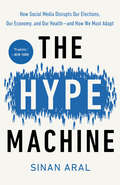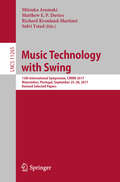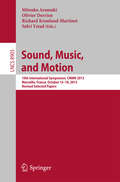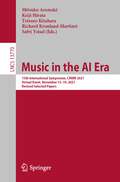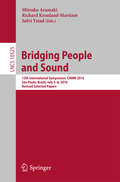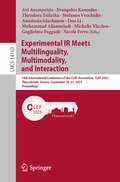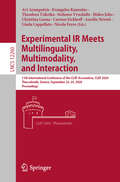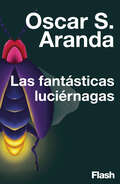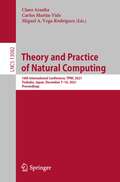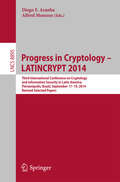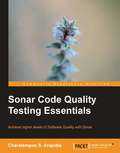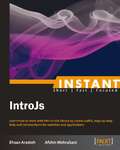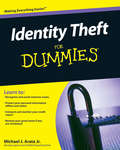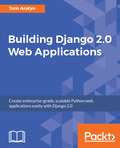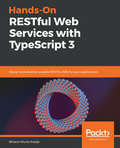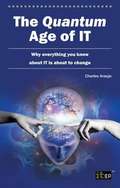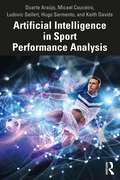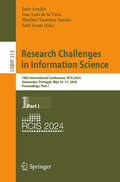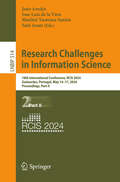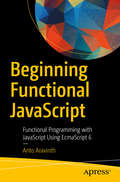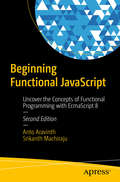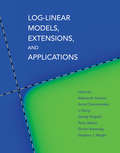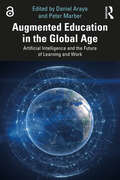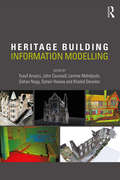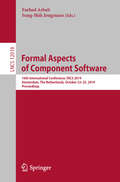- Table View
- List View
The Hype Machine: How Social Media Disrupts Our Elections, Our Economy, and Our Health--and How We Must Adapt
by Sinan AralA landmark insider&’s tour of how social media affects our decision-making and shapes our world in ways both useful and dangerous, with critical ideas on how to protect ourselves in the 2020 election and beyond &“The most important book of the year . . . a lively, engaging masterpiece.&”—Erik Brynjolfsson, bestselling co-author of The Second Machine AgeMIT professor Sinan Aral isn&’t only one of the world&’s leading experts on social media—he&’s also an entrepreneur and investor, giving him an unparalleled 360-degree view of the technology&’s great promise as well as its outsize capacity to damage our politics, our economy, and even our personal health. Drawing on two decades of his own research and business experience, Aral goes under the hood of the biggest, most powerful social networks to tackle the critical question of just how much social media actually shapes our choices, for better or worse. Aral shows how the tech behind social media offers the same set of behavior-influencing levers to both Russian hackers and brand marketers—to everyone who hopes to change the way we think and act—which is why its consequences affect everything from elections to business, dating to health. Along the way, he covers a wide array of topics, including how network effects fuel Twitter&’s and Facebook&’s massive growth to the neuroscience of how social media affects our brains, the real consequences of fake news, the power of social ratings, and the impact of social media on our kids.In mapping out strategies for being more thoughtful consumers of social media, The Hype Machine offers the definitive guide to understanding and harnessing for good the technology that has redefined our world overnight.
Music Technology with Swing: 13th International Symposium, CMMR 2017, Matosinhos, Portugal, September 25-28, 2017, Revised Selected Papers (Lecture Notes in Computer Science #11265)
by Mitsuko Aramaki Matthew E. Davies Richard Kronland-Martinet Sølvi YstadThis book constitutes the refereed proceedings of the 13th International Symposium on Music Technology with Swing, CMMR 2017, held in Matosinhos, Portugal, in September 2017. The 44 full papers presented were selected from 64 submissions. The papers are grouped in eight sections: music information retrieval, automatic recognition, estimation and classification, electronic dance music and rhythm, computational musicology, sound in practice: auditory guidance and feedback in the context of motor learning and motor adaptation, human perception in multimodal context, cooperative music networks and musical HCIs, virtual and augmented reality, research and creation: spaces and modalities.
Sound, Music, and Motion
by Mitsuko Aramaki Olivier Derrien Richard Kronland-Martinet Sølvi YstadThis book constitutes the thoroughly refereed post-conference proceedings of the 10th International Symposium on Computer Music Modeling and Retrieval, CMMR 2013, held in Marseille, France, in October 2013. The 38 conference papers presented were carefully reviewed and selected from 94 submissions. The chapters reflect the interdisciplinary nature of this conference with following topics: augmented musical instruments and gesture recognition, music and emotions: representation, recognition, and audience/performers studies, the art of sonification, when auditory cues shape human sensorimotor performance, music and sound data mining, interactive sound synthesis, non-stationarity, dynamics and mathematical modeling, image-sound interaction, auditory perception and cognitive inspiration, and modeling of sound and music computational musicology.
Music in the AI Era: 15th International Symposium, CMMR 2021, Virtual Event, November 15–19, 2021, Revised Selected Papers (Lecture Notes in Computer Science #13770)
by Mitsuko Aramaki Keiji Hirata Tetsuro Kitahara Richard Kronland-Martinet Sølvi YstadThis book constitutes the refereed proceedings and revised selected papers from the 15th International Symposium on Music in the AI Era, CMMR 2021, which took place during November 15–19, 2021 as a virtual event. The 24 full papers included in this book were carefully reviewed and selected from 48 submissions. The papers are grouped in thematical sessions on Music technology in the IA era; Interactive systems for music; Music Information Retrieval and Modeling; and Music and Performance Analysis.
Bridging People and Sound: 12th International Symposium, CMMR 2016, São Paulo, Brazil, July 5–8, 2016, Revised Selected Papers (Lecture Notes in Computer Science #10525)
by Mitsuko Aramaki Richard Kronland-Martinet Sølvi YstadThis book constitutes the thoroughly refereed post-conference of the 12th International Symposium on Computer Music Modeling and Retrieval, CMMR 2016, held in S#65533;o Paulo, Brazil, in July 2016. The 22 full papers presented were carefully reviewed and selected from 40 submissions. This year's conference theme "Bridging People and Sound" aimed at encouraging contributions from artists and listeners on the one side and audio and music technology researchers on the other.
Experimental IR Meets Multilinguality, Multimodality, and Interaction: 14th International Conference of the CLEF Association, CLEF 2023, Thessaloniki, Greece, September 18–21, 2023, Proceedings (Lecture Notes in Computer Science #14163)
by Avi Arampatzis Evangelos Kanoulas Theodora Tsikrika Stefanos Vrochidis Anastasia Giachanou Dan Li Mohammad Aliannejadi Michalis Vlachos Guglielmo Faggioli Nicola FerroThis volume LNCS 14163 constitutes the refereed proceedings of 14th International Conference of the CLEF Association, CLEF 2023, in Thessaloniki, Greece, during September 18–21, 2023. The 10 full papers and one short paper included in this book were carefully reviewed and selected from 35 submissions. The conference focuses on authorship attribution, fake news detection and news tracking, noise-detection in automatically transferred relevance judgments, impact of online education on children’s conversational search behavior, analysis of multi-modal social media content, knowledge graphs for sensitivity identification, a fusion of deep learning and logic rules for sentiment analysis, medical concept normalization and domain-specific information extraction.In addition to this, the volume presents 7 “Best of the labs” papers which were reviewed as full paper submissions with the same review criteria. 13 lab overview papers were accepted and represent scientific challenges based on new datasets and real world problems in multimodal and multilingual information access.
Experimental IR Meets Multilinguality, Multimodality, and Interaction: 11th International Conference of the CLEF Association, CLEF 2020, Thessaloniki, Greece, September 22–25, 2020, Proceedings (Lecture Notes in Computer Science #12260)
by Avi Arampatzis Evangelos Kanoulas Theodora Tsikrika Stefanos Vrochidis Hideo Joho Christina Lioma Carsten Eickhoff Aurélie Névéol Linda Cappellato Nicola FerroThis book constitutes the refereed proceedings of the 11th International Conference of the CLEF Association, CLEF 2020, held in Thessaloniki, Greece, in September 2020.*The conference has a clear focus on experimental information retrieval with special attention to the challenges of multimodality, multilinguality, and interactive search ranging from unstructured to semi structures and structured data. The 5 full papers and 2 short papers presented in this volume were carefully reviewed and selected from 9 submissions. This year, the contributions addressed the following challenges: a large-scale evaluation of translation effects in academic search, advancement of assessor-driven aggregation methods for efficient relevance assessments, and development of a new test dataset. In addition to this, the volume presents 7 “best of the labs” papers which were reviewed as full paper submissions with the same review criteria. The 12 lab overview papers were accepted out of 15 submissions and represent scientific challenges based on new data sets and real world problems in multimodal and multilingual information access. * The conference was held virtually due to the COVID-19 pandemic.
Las fantásticas luciérnagas
by Oscar S. ArandaOscar S. Aranda desvela los secretos que se esconden tras la luz de las luciérnagas. A través de los recuerdos, el autor de El lenguaje secreto de la naturaleza nos invita a descubrir el luminoso sistema de comunicación de las luciérnagas. Unos insectos que frecuentemente se han comparado con las hadas y que se han visto obligados a adaptarse de formas sorprendentes a la contaminación lumínica actual.
Theory and Practice of Natural Computing: 10th International Conference, TPNC 2021, Virtual Event, December 7–10, 2021, Proceedings (Lecture Notes in Computer Science #13082)
by Claus Aranha Carlos Martín-Vide Miguel A. Vega-RodríguezThis book constitutes the refereed proceedings of the 10th International Conference on Theory and Practice of Natural Computing, TPNC 2021, held virtually, in December 2021. The 9 full papers presented together with 3 invited talks, in this book were carefully reviewed and selected from 14 submissions. The papers are organized in topical sections named Applications of Natural Computing, Deep Learning and Transfer Learning, Evolutionary and Swarm Algorithms.
Progress in Cryptology - LATINCRYPT 2014
by Diego F. Aranha Alfred MenezesThis book constitutes the proceedings of the 3rd International Conference on Cryptology and Information Security in Latin America, LATINCRYPT 2014, held in Florianópolis, Brazil, in September 2014. The 19 papers presented together with four invited talks were carefully reviewed and selected from 48 submissions. The papers are organized in topical sections on cryptographic engineering, side-channel attacks and countermeasures, privacy, crypto analysis and cryptographic protocols.
Sonar Code Quality Testing Essentials
by Charalampos ArapidisThis is a step-by-step tutorial enriched with practical examples and the necessary screenshots for easy and quick learning. This book is for you if you are a Java developer or a Team Manager familiar with Java and want to ensure the quality of your code using Sonar. You should have a background with Java and unit testing in general.
Instant IntroJs
by Ehsan Arasteh Afshin MehrabaniGet to grips with a new technology, understand what it is and what it can do for you, and then get to work with the most important features and tasks. A simple starter that will guide you through IntroJs from scratch to advanced topics using a simple step by step approach with useful examples along the way.This book is for web designers who want to create an interactive step-by-step introduction for showing specific or all parts of an application or website to users. Basic JavaScript programming and knowledge of HTML and CSS is required. No knowledge of any other JavaScript libraries is needed.
Identity Theft For Dummies
by Michael J. Arata Jr.Practical solutions to help you deter, detect, and defend against identity theft In 2008, 9. 9 million Americans became victims of identity theft. The cost exceeded $48 billion in 2008; consumers spend some $5 billion out-of-pocket each year to clear up resulting fraud issues. This guide will help keep you from becoming the next victim. Written by a veteran security professional, Identity Theft For Dummies gives you the tools to recognize what information is vulnerable, minimize your risk, stay safe online, and practice damage control if your identity is compromised. If you have a name, a date of birth, and a Social Security number, you're a potential victim; this book helps you recognize your risk and defend against identity thieves Explains what identity theft is, how it happens, and how to recognize if you have become a victim Shows how to protect your personal information, how to be discreet in public places, how to interpret your credit report, and why you should monitor your financial statements Helps you recognize risks you may not have considered, such as what you set at the curb on trash day Provides advice on how to clear your name if you are victimized Identity Theft For Dummies arms you to fight back against this growing threat.
Building Django 2.0 Web Applications: Create enterprise-grade, scalable Python web applications easily with Django 2.0
by Tom AratynGo from the initial idea to a production-deployed web app using Django 2.0.Key FeaturesA beginners guide to learning python's most popular framework, DjangoBuild fully featured web projects in Django 2.0 through examples.Deploy web applications in quick and reliable fashion with DockerBook DescriptionThis project-based guide will give you a sound understanding of Django 2.0 through three full-featured applications. It starts off by building a basic IMDB clone and adding users who can register, vote on their favorite movies, and upload associated pictures. You will learn how to use the votes that your users have cast to build a list of the top 10 movies. This book will also take you through deploying your app into a production environment using Docker containers hosted on the server in Amazon's Electric Computing Cloud (EC2).Next, you're going to build a Stack Overflow clone wherein registered users can ask and answer questions. You will learn how to enable a user asking a question to accept answers and mark them as useful. You will also learn how to add search functionality to help users find questions by using ElasticSearch. You'll discover ways to apply the principles of 12 factor apps while deploying Django on the most popular web server, Apache, with mod_wsgi. Lastly, you'll build a clone of MailChimp so users can send and create emails, and deploy it using AWS.Get set to take your basic Python skills to the next level with this comprehensive guide!What you will learn1. Build new projects from scratch using Django 2.02. Provide full-text searching using ElasticSearch and Django 2.03. Learn Django 2.0 security best practices and how they're applied4. Deploy a full Django 2.0 app almost anywhere with mod_wsgi5. Deploy a full Django 2.0 app to AWS's PaaS Elastic Beanstalk6. Deploy a full Django 2.0 app with Docker7. Deploy a full Django 2.0 app with NGINX and uWSGIWho this book is forIf you have some basic knowledge of HTML, CSS, and Python and want to build fully-featured and secure applications using Django, then this book is for you.
Hands-On RESTful Web Services with TypeScript 3: Design and develop scalable RESTful APIs for your applications
by Biharck AraújoThe book is aimed at web developers who have a basic understanding of the REST concepts and want to familiarize themselves with the idea of designing and developing RESTful APIs.
The Quantum Age of IT
by Charles Araujo'IT as we know it is dead.' Forces are at work that are reshaping the very fabric of the IT organization. Driven by our own history, changing perceptions of how technology should work and newfound, but very real, competition, IT organizations are struggling to evolve - but into what? In The Quantum Age of IT, Charles Araujo examines what has led us to this point and what it means to the future of IT organizations. With a broad perspective on the fundamental changes affecting the industry, he offers practical guidance that every IT professional needs to compete in this new era of IT. Whether you are an IT executive, or just beginning your career, this book will offer you the key insights you need to understand what is happening and what is coming. Understanding that future, Araujo blends a wide range of research and case studies to help you discover the skills you must develop in order to succeed and thrive in The Quantum Age of IT. As you read this book, you will be able to: • Understand how and why your IT function has changed and define its future role • Compete in this new age by embracing the five traits that will define the IT organization of The Quantum Age • Remain effective and relevant as you understand and implement fundamental changes to future-proof your IT function • Maintain and develop excellent customer relations by better understanding your clients and their requirements • Meet the unique needs of all your customers, as you adopt the five key skills that all IT professionals will have to have • Learn from the past and look forward to a bright future!
Artificial Intelligence in Sport Performance Analysis
by Duarte Araújo Micael S Couceiro Ludovic Seifert Hugo Sarmento Keith DavidsTo understand the dynamic patterns of behaviours and interactions between athletes that characterize successful performance in different sports is an important challenge for all sport practitioners. This book guides the reader in understanding how an ecological dynamics framework for use of artificial intelligence (AI) can be implemented to interpret sport performance and the design of practice contexts. By examining how AI methodologies are utilized in team games, such as football, as well as in individual sports, such as golf and climbing, this book provides a better understanding of the kinematic and physiological indicators that might better capture athletic performance by looking at the current state-of-the-art AI approaches. Artificial Intelligence in Sport Performance Analysis provides an all-encompassing perspective in an innovative approach that signals practical applications for both academics and practitioners in the fields of coaching, sports analysis, and sport science, as well as related subjects such as engineering, computer and data science, and statistics.
Research Challenges in Information Science: 18th International Conference, RCIS 2024, Guimarães, Portugal, May 14–17, 2024, Proceedings, Part I (Lecture Notes in Business Information Processing #513)
by João Araújo Jose Luis de la Vara Maribel Yasmina Santos Saïd AssarThis book constitutes the proceedings of the 18th International Conference on Research Challenges in Information Sciences, RCIS 2024, which took place in Guimarães, Portugal, during May 2024. The scope of RCIS is summarized by the thematic areas of information systems and their engineering; user-oriented approaches; data and information management; business process management; domain-specific information systems engineering; data science; information infrastructures, and reflective research and practice. The 25 full papers, 12 Forum and 5 Doctoral Consortium papers included in these proceedings were carefully reviewed and selected from 100 submissions. They were organized in topical sections as follows: Part I: Data and information management; conceptual modelling and ontologies; requirements and architecture; business process management; data and process science; security; sustainability; evaluation and experience studies Part II: Forum papers; doctoral consortium papers.
Research Challenges in Information Science: 18th International Conference, RCIS 2024, Guimarães, Portugal, May 14–17, 2024, Proceedings, Part II (Lecture Notes in Business Information Processing #514)
by João Araújo Jose Luis de la Vara Maribel Yasmina Santos Saïd AssarThis book constitutes the proceedings of the 18th International Conference on Research Challenges in Information Sciences, RCIS 2024, which took place in Guimarães, Portugal, during May 2024. The scope of RCIS is summarized by the thematic areas of information systems and their engineering; user-oriented approaches; data and information management; business process management; domain-specific information systems engineering; data science; information infrastructures, and reflective research and practice. The 25 full papers, 12 Forum and 5 Doctoral Consortium papers included in these proceedings were carefully reviewed and selected from 100 submissions. They were organized in topical sections as follows: Part I: Data and information management; conceptual modelling and ontologies; requirements and architecture; business process management; data and process science; security; sustainability; evaluation and experience studies Part II: Forum papers; doctoral consortium papers.
Beginning Functional JavaScript: Functional Programming with JavaScript Using EcmaScript 6
by Anto AravinthLearn functional programming concepts using JavaScript ES6. You will learn concepts such as currying, partial functions, higher-order functions, and monads.Programming languages have evolved from focusing on procedures to objects and now on function. JavaScript supports functional programming and allows developers to write well-crafted code.What You Will Learn: Master functional programming conceptsIdentify how functions are treated in JavaScriptUnderstand real-world functional libraries and create a functional library that mimics underscore.jsPerform pure-error handling techniques such as functors and monadsDiscover ES6 functional features such as spread operators and generatorsWho This Book Is For: JavaScript developers (or beginners) who want to understand functional programming concepts and the functional nature of the language.
Beginning Functional JavaScript: Uncover the Concepts of Functional Programming with EcmaScript 8
by Anto Aravinth Srikanth MachirajuUnderstand functional programming concepts and the functional nature of the JavaScript language. Starting with an introduction to functional programming concepts, you will learn the key differences between imperative and functional programming. Diving straight into JavaScript functions, you will learn to write them with ES8. Followed by this you will move to higher order functions and learn how 'Function as Data' opens up a world of possibilities. You will then build higher order functions with closures. Arrays will then be introduced, followed by a set of APIs you can use with them. You will learn how to transform one function to another using currying and partial application. The compose function will be discussed in detail, followed by functors and monads. After having an in-depth look at applicative functors, you will learn the new features offered in ES8. The concluding chapters of Beginning Functional JavaScript will show you how to use a functional toolkit to build a small library that allows you to develop web applications, followed by tips on testing your functional code.What You Will Learn Discover functional programming concepts such as string padding and async functionsIdentify how functions are treated in JavaScriptCreate a functional library that mimics Underscore.JSDeep dive into ES8 functional features such as spread operators and generatorsCreate a library that works like the react-redux pattern by following the functional paradigmWho This Book Is ForNovice JavaScript developers.
Log-Linear Models, Extensions, and Applications (Neural Information Processing Series)
by Aleksandr Aravkin Anna Choromanska Georg Heigold Li Deng Tony JebaraAdvances in training models with log-linear structures, with topics including variable selection, the geometry of neural nets, and applications. Log-linear models play a key role in modern big data and machine learning applications. From simple binary classification models through partition functions, conditional random fields, and neural nets, log-linear structure is closely related to performance in certain applications and influences fitting techniques used to train models. This volume covers recent advances in training models with log-linear structures, covering the underlying geometry, optimization techniques, and multiple applications. The first chapter shows readers the inner workings of machine learning, providing insights into the geometry of log-linear and neural net models. The other chapters range from introductory material to optimization techniques to involved use cases. The book, which grew out of a NIPS workshop, is suitable for graduate students doing research in machine learning, in particular deep learning, variable selection, and applications to speech recognition. The contributors come from academia and industry, allowing readers to view the field from both perspectives. Contributors Aleksandr Aravkin, Avishy Carmi, Guillermo A. Cecchi, Anna Choromanska, Li Deng, Xinwei Deng, Jean Honorio, Tony Jebara, Huijing Jiang, Dimitri Kanevsky, Brian Kingsbury, Fabrice Lambert, Aurélie C. Lozano, Daniel Moskovich, Yuriy S. Polyakov, Bhuvana Ramabhadran, Irina Rish, Dimitris Samaras, Tara N. Sainath, Hagen Soltau, Serge F. Timashev, Ewout van den Berg
Augmented Education in the Global Age: Artificial Intelligence and the Future of Learning and Work
by Daniel Araya Peter MarberAugmented Education in the Global Age: Artificial Intelligence and the Future of Learning and Work is an edited collection that explores the social impact of Artificial Intelligence over the coming decades, specifically how this emerging technology will transform and disrupt our contemporary institutions. Chapters in this book discuss the history of technological revolutions and consider the anxieties and social challenges of lost occupations, as well as the evolution of new industries overlapping robotics, biotechnology, space exploration, and clean energy. Chapter authors unpack the nature of augmented education, from revamping curriculum and personalizing education, to redesigning workplace learning for an algorithmic era. Ultimately the book discusses policy and planning for an augmented future, arguing that work and learning are undergoing a metamorphosis around creativity and innovation amid a new global era and the race against automating technologies. Bringing together expert perspectives from around the world, this exciting, informative collection of research and analysis helps educators, policymakers and analysts navigate the future of work and learning amid rapid and accelerating technological change. The Open Access version of this book, available at http://www.taylorfrancis.com, has been made available under a Creative Commons Attribution-Non Commercial-No Derivatives (CC-BY-NC-ND) 4.0 license.
Heritage Building Information Modelling
by Yusuf Arayici John Counsell Lamine Mahdjoubi Gehan Ahmed Nagy Soheir Hawas Khaled DweidarBuilding Information Modelling (BIM) is being debated, tested and implemented wherever you look across the built environment sector. This book is about Heritage Building Information Modelling (HBIM), which necessarily differs from the commonplace applications of BIM to new construction. Where BIM is being used, the focus is still very much on design and construction. However, its use as an operational and management tool for existing buildings, particularly heritage buildings, is lagging behind. The first of its kind, this book aims to clearly define the scope for HBIM and present cutting-edge research findings alongside international case studies, before outlining challenges for the future of HBIM research and practice. After an extensive introduction to HBIM, the core themes of the book are arranged into four parts: Restoration philosophies in practice Data capture and visualisation for maintenance and repair Building performance Stakeholder engagement This book will be a key reference for built environment practitioners, researchers, academics and students engaged in BIM, HBIM, building energy modelling, building surveying, facilities management and heritage conservation more widely.
Formal Aspects of Component Software: 16th International Conference, FACS 2019, Amsterdam, The Netherlands, October 23–25, 2019, Proceedings (Lecture Notes in Computer Science #12018)
by Farhad Arbab Sung-Shik JongmansThis book constitutes the thoroughly revised selected papers from the 16th International Conference on Formal Aspects of Component Software, FACS 2019, held in Amsterdam, The Netherlands, in October 2019.The 9 full papers presented together with 9 full papers and 3 short papers as well as 2 other papers were carefully reviewed and selected from 27 submissions. FACS 2019 is concerned with how formal methods can be used to make component-based and service-oriented software development succeed. Formal methods have provided a foundation for component-based software by successfully addressing challenging issues such as mathematical models for components, composition and adaptation, or rigorous approaches to verification, deployment, testing, and certification.
